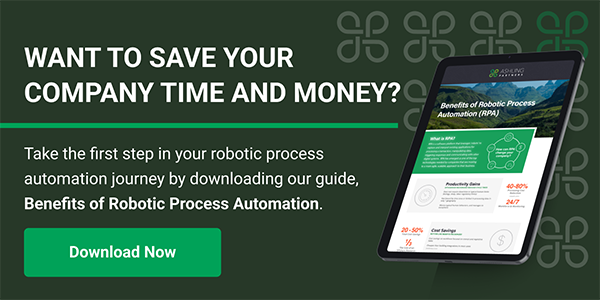Research firms cite Robotic Process Automation (RPA) as the fastest growing sector of the enterprise software market (Gartner 2019). Theirs is an ostensibly holistic perspective. Other perspectives include those of operations and finance management who see fast opportunities for both cost savings and revenue growth at scale, those of IT management who see benefits and perhaps some organizational tension as traditional IT functions move to the citizen developer, and those of the skeptic who views The Matrix and Terminator with a literal versus exegetical eye. It is useful to tease out one of those perspectives. Consider RPA through the lens of the Enterprise Resource Planning (ERP) Expert.

Why the ERP Expert?
If you are one of them, think of the pragmatic reason for starters. You will be drafted to participate in an RPA initiative at some point. Might as well enlist. There is the proactive reason as well: the excitement of real, measurable change. Traditional and even modern hybrid ERP seems to have exhausted that fuel. RPA reignites the engine of change. Although research firms cite particular silos within ERP as innovative, much of ERP is beyond mature. Recent advancements in the field have more to do with infrastructure (move to Cloud) and licensing (SaaS) than anything implementors see as real innovation. RPA implements real, positive change for ERP among many other technical domains. Lastly, personally, as an ERP Expert, you are made for RPA.
Why ERP?
What is ERP meant to be, at its best? It is a single source of truth for your back-office information. Traditional ERP promises AP, AR, Fixed Assets, Procurement, Billing, Payroll, HR, Time and Labor, Expenses, and the General Ledger all on one database in a common schema. This value proposition alone makes ERP a ripe candidate for any tech advancements including (especially) RPA.
Where does the promise of ERP break down? Even back when on-premises ERP ruled the day, large organizations tended to silo HR and Financials. So, ERP was often not really ERP. These days, it tends to be hybrid, as advancements in integration technology, APIs, and mature knowledge of proprietary data models usurps the promise and even the need for a single database instance. Below these systemic challenges lie particular use cases that vex top ERP implementors. Here are a few of those, pulled from the world of Financial ERP:
- The Accounts Receivable Cash Application hit-rate is too low, and AR Specialists spend too much time figuring out what invoices a customer is trying to pay.
- General Ledger period close and subsystem reconciliation takes too long.
- Fixed Asset systems fail to record complex corporate book versus tax scenarios in environments with high volumes of transfers, retirements, and reinstatements.
- Supplier invoice processing hits bottlenecks and backlogs, frustrating cashflow and putting operations at risk.
Subsequent articles will delve into how RPA solutions have solved these particular use cases. But as an ERP Expert, it is worthwhile to understand the generalization. One might ask, since modern ERPs advertise solutions to all these problems, why would they ever happen in the real world? In general, these problems persist due to the following:
- Shortcomings in the ERP software itself. Yes, these do exist. Sorry, vendors.
- Mistakes or omissions in the ERP implementation. This happens too. Sorry, consultants.
- Running out of scope, time, or money. This happens a lot. Sorry, PMO.
- Hybrid best-of-breeds do not always play well together. Yes, they are supposed to. Often do not. Sorry, research firms.
This list could grow ad-infinitum, but each observation begs a question. Why not put in the effort to solve it? The general answer is that the solutions are hard. Reworking a tightly integrated mission-critical system is risky and costly. Enter RPA.
The Human User
Rather than boil the ERP ocean, RPA takes the situation as it is, turning the focus on the human user. It is this human user keeping the ship afloat despite the leaks described in those use-cases. RPA observes patterns and asks what tasks are repetitive and uncreative; what occupies the human user’s time to the extent that they have no bandwidth to analyze and add value. Such tasks, we automate. The results are measurable and, on an ERP timeline, very fast.
So, as an ERP Expert, why care about RPA? It implements advanced technology to solve your common problems in exciting and fun new ways. Your ERP world is ripe for this technology. And your functional and technical experience puts you in a great position to take advantage of this new technology.
Interested in learning more about RPA? Request a Consultation to get started today!


